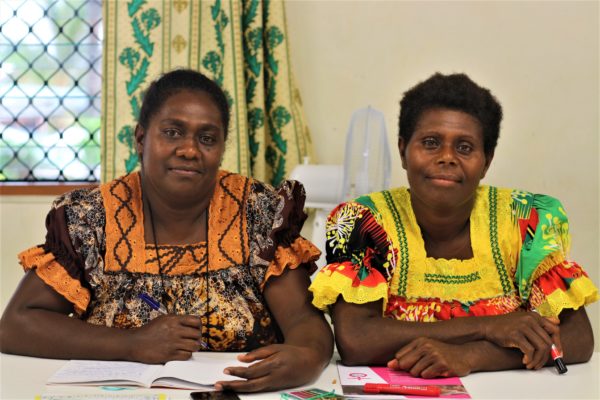Insecure, informal, low-wage jobs. Underpaid for the same work as men. Denied access to and control over vital resources. Undervaluing of unpaid care work.
Gender inequality and discrimination means women face all the above and more in the world of work. For women who are also discriminated against because of other aspects of their identity – such as their age, religion or ethnicity – the barriers they face are even greater.
Globally, 2.4 billion women of working age are not afforded the same economic rights as men (1). 178 countries still have legal barriers that prevent women’s full economic participation and 95 countries do not guarantee equal pay for equal work (2). In developing countries, if women were paid as much as men and had the same access to jobs as men, they could be US$9 trillion better off (3).
The COVID-19 pandemic has exacerbated the economic challenges women face. In the first year of the pandemic, 54 million women were pushed out of work (4), consequently, the gender gap in employment has widened, reversing many hard-won gender equality gains. This makes the championing of women’s economic empowerment more urgent than ever before.
Why does economic empowerment for women matter?
Women’s economic empowerment means women can:
- Gain equal access to economic resources like land and financial resources;
- Engage in safe and dignified work with access to social protection such as paid maternity leave;
- Receive equal pay;
- and women’s unpaid labour is valued.
It also means increasing women’s meaningful participation in economic decisions that impact themselves, their families, and their communities.
Increasing women’s economic empowerment remains vital for achieving gender equality. When women are supported to participate in economic activities, the benefits are felt throughout the household and the wider community. The ripple effects of women’s economic empowerment can lead to improvements in children’s access to education and healthcare, result in reductions in gender-based violence and a decrease in poverty. This is because women tend to spend 80 percent of their income on their families’ wellbeing and education, and for that reason, resourcing women also helps pave the way for the next generation (5).
In addition, when women are given the tools to gain financial independence and advocate for themselves, they can challenge patriarchal beliefs and structures within their community. If we want to create inclusive and equitable economies and societies, women’s economic empowerment must be prioritised.
The Ni-Vanuatu women coming together to fight for their economic rights
Collective action is vital to advancing women’s economic empowerment. When women come together and raise their voices against economic injustice, they gain the strength, courage, and protection they need to claim their rights and challenge unjust economic systems.
This is happening in Vanuatu, a country where women have been denied control over their financial resources for generations.
Ni-Vanuatu women are coming together to build safe spaces where women can share their ideas, learn new skills, and become economically empowered. Seven Economic Hubs, supported by ActionAid, Australian Department of Foreign Affairs and Australian NGO Corporation Program (ANCP), are being designed and established by local women to help lift women and their communities out of financial insecurity, and build resilience to future crises.
Esther, a mother of five, dreams of a future for her children where they are educated, and her daughters are never financially dependent on men. After joining ActionAid as a community mobiliser with the Women I Tok Tok Tugeta Program, Esther no longer needs to depend on the men in her family to put food on the table.
“Joining ActionAid as a community mobiliser has helped me a lot. It has helped me to know my role as a woman in my community. ActionAid’s livelihood assistance has helped me to pay for my children’s school fees and put enough food on the table for my family.”

Esther (Left) and Janeth (Right), Community Mobilisers with the WITTT network in Vanuatu and participants in the Economic Hubs initiative.
Esther has been one of the key advocates of, and a driving force behind, the Economic Hubs initiative. She is immensely proud to be involved in the project and believes it will have a lasting impact on local women’s lives in Vanuatu
“The Economic Hubs are a very good thing because they will help many women to create their own source of income and establish a stable livelihood. After a disaster, the Economic Hubs will support us in rebuilding our lives faster and in line with our priorities without needing to rely on handouts from men or the chiefs.”
The Economic Hubs will help women like Esther to access a sustainable income even in times of crises, and champion women on their pathway to becoming financially independent and economically empowered.
Together we can empower women to change the world.
References
(1) Nearly 2.4 billion women globally don’t have the same economic rights as men, World Bank, https://www.worldbank.org/en/news/press-release/2022/03/01/nearly-2-4-billion-women-globally-don-t-have-same-economic-rights-as-men
(2)Women, Business and the Law 2022 Report, World Bank, https://wbl.worldbank.org/en/wbl
(3) Close the gap! The cost of inequality in women’s work, ActionAid, https://www.actionaid.org.uk/sites/default/files/publications/womens_rights_on-line_version_2.1.pdf
(4) Building Forward Fairer: Women’s Rights to work and at work at the core of the COVID-19 recovery, International Labour Organisation, https://www.ilo.org/wcmsp5/groups/public/—dgreports/—gender/documents/publication/wcms_814499.pdf
(5)5 ways to promote women’s economic empowerment, Global Citizen, https://www.globalcitizen.org/en/content/ways-to-promote-womens-economic-empowerment/